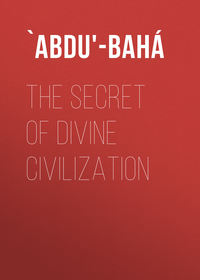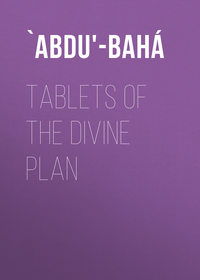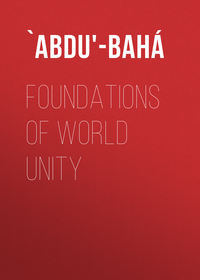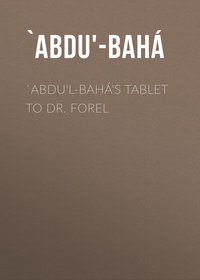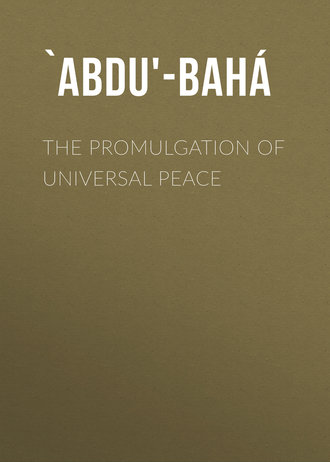 полная версия
полная версияThe Promulgation of Universal Peace
Question: What is the status of woman in the Orient?
Answer: The status of woman in former times was exceedingly deplorable, for it was the belief of the Orient that it was best for woman to be ignorant. It was considered preferable that she should not know reading or writing in order that she might not be informed of events in the world. Woman was considered to be created for rearing children and attending to the duties of the household. If she pursued educational courses, it was deemed contrary to chastity; hence women were made prisoners of the household. The houses did not even have windows opening upon the outside world. Bahá’u’lláh destroyed these ideas and proclaimed the equality of man and woman. He made woman respected by commanding that all women be educated, that there be no difference in the education of the two sexes and that man and woman share the same rights. In the estimation of God there is no distinction of sex. One whose thought is pure, whose education is superior, whose scientific attainments are greater, whose deeds of philanthropy excel, be that one man or woman, white or colored, is entitled to full rights and recognition; there is no differentiation whatsoever. Therefore, the status of women in the East has undergone change. At present they attend schools and colleges, pursue the ordinary curriculum and day by day are becoming indispensable to men and equal to them. This is the present condition of womankind in Persia.
Question: What relation do you sustain to the founder of your belief? Are you his successor in the same manner as the Pope of Rome?
Answer: I am the servant of Bahá’u’lláh, the Founder; and in this I glory. No honor do I consider greater than this, and it is my hope that I may be confirmed in servitude to Bahá’u’lláh. This is my station.
Question: Is it not a fact that universal peace cannot be accomplished until there is political democracy in all the countries of the world?
Answer: It is very evident that in the future there shall be no centralization in the countries of the world, be they constitutional in government, republican or democratic in form. The United States may be held up as the example of future government—that is to say, each province will be independent in itself, but there will be federal union protecting the interests of the various independent states. It may not be a republican or a democratic form. To cast aside centralization which promotes despotism is the exigency of the time. This will be productive of international peace. Another fact of equal importance in bringing about international peace is woman’s suffrage. That is to say, when perfect equality shall be established between men and women, peace may be realized for the simple reason that womankind in general will never favor warfare. Women will not be willing to allow those whom they have so tenderly cared for to go to the battlefield. When they shall have a vote, they will oppose any cause of warfare. Another factor which will bring about universal peace is the linking together of the Orient and the Occident.
Question: What is your belief about reincarnation?
Answer: The subject of reincarnation has two aspects. One is that which the Hindustani people believe, and even that is subdivided into two: reincarnation and metempsychosis. According to one belief the soul goes and then returns in certain reincarnations; therefore, they say that a sick person is sick because of actions in a previous incarnation and that this is retribution. The other school of Hinduism believes that man sometimes appears as an animal—a donkey, for instance—and that this is retribution for past acts. I am referring to the beliefs in that country, the beliefs of the schools. There is a reincarnation of the prophetic mission. Jesus Christ, speaking of John the Baptist, declared he was Elias. When John the Baptist was questioned, “Art thou Elias?” he said, “I am not.” These two statements are apparently contradictory, but in reality they do not contradict. The light is one light. The light which illumined this lamp last night is illuminating it tonight. This does not mean that the identical rays of light have reappeared but the virtues of illumination. The light which revealed itself through the glass reveals itself again so that we can say the light of this evening is the light of last evening relighted. This is as regards its virtues and not as regards its former identity. This is our view of reincarnation. We believe in that which Jesus Christ and all the Prophets have believed. For example, the Báb states, “I am the return of all the Prophets.” This is significant of the oneness of the prophetic virtues, the oneness of power, the oneness of bestowal, the oneness of radiation, the oneness of expression, the oneness of revelation.
Question: What is the attitude of your belief toward the family?
Answer: According to the teachings of Bahá’u’lláh the family, being a human unit, must be educated according to the rules of sanctity. All the virtues must be taught the family. The integrity of the family bond must be constantly considered, and the rights of the individual members must not be transgressed. The rights of the son, the father, the mother—none of them must be transgressed, none of them must be arbitrary. Just as the son has certain obligations to his father, the father, likewise, has certain obligations to his son. The mother, the sister and other members of the household have their certain prerogatives. All these rights and prerogatives must be conserved, yet the unity of the family must be sustained. The injury of one shall be considered the injury of all; the comfort of each, the comfort of all; the honor of one, the honor of all.
Question: What is the relation of the Bahá’í teaching to the ancient Zoroastrian religion?
Answer: The religions of God have the same foundation, but the dogmas appearing later have differed. Each of the divine religions has two aspects. The first is essential. It concerns morality and development of the virtues of the human world. This aspect is common to all. It is fundamental; it is one; there is no difference, no variation in it. As regards the inculcation of morality and the development of human virtues, there is no difference whatsoever between the teachings of Zoroaster, Jesus and Bahá’u’lláh. In this they agree; they are one. The second aspect of the divine religions is nonessential. It concerns human needs and undergoes change in every cycle according to the exigency of the time. For example, in the time of Moses divorce was conformable to the needs and conditions; Moses, therefore, established it. But in the time of Christ, divorces were numerous and the cause of corruption; as they were not suitable for the time, he made divorce unlawful and likewise changed other laws. These are needs and conditions which have to do with the conduct of society; therefore, they undergo change according to the exigency of the time. Moses dwelt in the desert. As there were no penitentiaries, no means of restitution in the desert and wilderness, the laws of God were an eye for an eye, a tooth for a tooth. Could this be carried out now? If a man destroys another man’s eye, are you willing to destroy the eye of the offender? If a man’s teeth are broken or his ear cut off, will you demand a corresponding mutilation of his assailant? This would not be conformable to conditions of humanity at the present time. If a man steals, shall his hand be cut off? This punishment was just and right in the law of Moses, but it was applicable to the desert, where there were no prisons and reformatory institutions of later and higher forms of government. Today you have government and organization, a police system, a judge and trial by jury. The punishment and penalty is now different. Therefore, the nonessentials which deal with details of community are changed according to the exigency of the time and conditions. But the essential foundation of the teachings of Moses, Zoroaster, Jesus and Bahá’u’lláh is identical, is one; there is no difference whatsoever.
Question: Is peace a greater word than love?
Answer: No! Love is greater than peace, for peace is founded upon love. Love is the objective point of peace, and peace is an outcome of love. Until love is attained, peace cannot be; but there is a so-called peace without love. The love which is from God is the fundamental. This love is the object of all human attainment, the radiance of heaven, the light of man.
Question: Will you state the tenets of your faith?
Answer: First, investigate reality. Man must leave imitation and seek reality. The contemporaneous religious beliefs differ because of their allegiance to dogma. It is necessary, therefore, to abandon imitations and seek their fundamental reality.
Second, the oneness of humanity. All human creatures are the servants of God. All are submerged in the sea of His mercy. The Creator of all is one God; the Provider, the Giver, the Protector of all is one God. He is kind to all; why should we be unkind? All live beneath the shadow of His love; why should we hate each other? There are certain people who are ignorant; they must be educated. Some are like children; they must be trained and educated until they reach maturity. Others are sickly, intellectually ill, spiritually ill; they must be treated and healed. But all are the servants of God.
Third, religion must be conducive to love of all, the cause of fellowship, unity and light. If it be the cause of enmity, bloodshed and hatred, its nonbeing is better than its being, its nonexistence better than its existence. Religion and science conform and agree. If a question of religion violates reason and does not agree with science, it is imagination and not worthy of credence.
Fourth, equality between men and women. In all degrees they are equal. The readjustment of the economic laws for the livelihood of man must be effected in order that all humanity may live in the greatest happiness according to their respective degrees.
Fifth, spiritual brotherhood. All mankind must attain to spiritual fraternity—that is to say, fraternity in the Holy Spirit—for patriotic, racial and political fraternity are of no avail. Their results are meager; but divine fraternity, spiritual fraternity, is the cause of unity and amity among mankind. As heretofore material civilization has been extended, the divine civilization must now be promulgated. Until the two agree, real happiness among mankind will be unknown. By mere intellectual development and power of reason, man cannot attain to his fullest degree—that is to say, by means of intellect alone he cannot accomplish the progress effected by religion. For the philosophers of the past strove in vain to revivify the world of mankind through the intellectual faculty. The most of which they were capable was educating themselves and a limited number of disciples; they themselves have confessed failure. Therefore, the world of humanity must be confirmed by the breath of the Holy Spirit in order to receive universal education. Through the infusion of divine power all nations and peoples become quickened, and universal happiness is possible.
These are some of the principles of the Bahá’ís.
Question: Will women or men aid this new religion most? Which will be more capable?
Answer: In Persia the men have aided it more, but in the West perchance the women. In the West women evidently have precedence in religion, but in the East men surpass the women.
Question: What will be the food of the united people?
Answer: As humanity progresses, meat will be used less and less, for the teeth of man are not carnivorous. For example, the lion is endowed with carnivorous teeth, which are intended for meat, and if meat be not found, the lion starves. The lion cannot graze; its teeth are of different shape. The digestive system of the lion is such that it cannot receive nourishment save through meat. The eagle has a crooked beak, the lower part shorter than the upper. It cannot pick up grain; it cannot graze; therefore, it is compelled to partake of meat. The domestic animals have herbivorous teeth formed to cut grass, which is their fodder. The human teeth, the molars, are formed to grind grain. The front teeth, the incisors, are for fruits, etc. It is, therefore, quite apparent according to the implements for eating that man’s food is intended to be grain and not meat. When mankind is more fully developed, the eating of meat will gradually cease.
8 June 1912
Talk at 309 West Seventy-eighth Street, New York
Notes by John G. GrundyThe body politic today is greatly in need of a physician. It is similar to a human body afflicted with severe ailments. A doctor diagnoses the case and prescribes treatment. He does not prescribe, however, until he has made the diagnosis. The disease which afflicts the body politic is lack of love and absence of altruism. In the hearts of men no real love is found, and the condition is such that, unless their susceptibilities are quickened by some power so that unity, love and accord may develop within them, there can be no healing, no agreement among mankind. Love and unity are the needs of the body politic today. Without these there can be no progress or prosperity attained. Therefore, the friends of God must adhere to the power which will create this love and unity in the hearts of the sons of men. Science cannot cure the illness of the body politic. Science cannot create amity and fellowship in human hearts. Neither can patriotism nor racial allegiance effect a remedy. It must be accomplished solely through the divine bounties and spiritual bestowals which have descended from God in this day for that purpose. This is an exigency of the times, and the divine remedy has been provided. The spiritual teachings of the religion of God can alone create this love, unity and accord in human hearts.
Therefore, hold to these heavenly agencies which God has provided so that through the love of God this soul-bond may be established, this heart-attachment realized and the light of the reality of unity be reflected from you throughout the universe. If we do not hold fast to these divine agencies and means, no result will be possible. Let us pray to God that He will exhilarate our spirits so we may behold the descent of His bounties, illumine our eyes to witness His great guidance and attune our ears to enjoy the celestial melodies of the heavenly Word. This is our greatest hope. This is our ultimate purpose.
TALKS ‘ABDU’L-BAHÁ DELIVERED IN PHILADELPHIA
9 June 1912
Talk at Unitarian Church
Fifteenth Street and Girard Avenue, Philadelphia, Pennsylvania
Notes by Edna McKinneyI have come from distant countries of the Orient where the lights of heaven have ever shone forth, from regions where the Manifestations of God have appeared and the radiance and power of God have been revealed to mankind. The purpose and intention of my visit is that, perchance, a bond of unity and agreement may be established between the East and West, that divine love may encompass all nations, divine radiance enlighten both continents and the bounties of the Holy Spirit revivify the body of the world. Therefore, I supplicate the threshold of God that the Orient and Occident may become as one, that the various peoples and religions be unified and souls be blended as the waves of one sea. May they become as trees, flowers and roses which adorn and beautify the same garden.
The realm of Divinity is an indivisible oneness, wholly sanctified above human comprehension; for intellectual knowledge of creation is finite, whereas comprehension of Divinity is infinite. How can the finite comprehend the infinite? We are utter poverty, whereas the reality of Divinity is absolute wealth. How can utter poverty understand absolute wealth? We are utter weakness, whereas the reality of Divinity is absolute power. Utter weakness can never attain nor apprehend absolute power. The phenomenal beings, which are captives of limitations, are ever subject to transformation and change in condition. How can such phenomenal beings ever grasp the heavenly, eternal, unchanging reality? Assuredly this is an absolute impossibility, for when we study the creational world, we see that the difference of degree is a barrier to such knowing. An inferior degree can never comprehend a higher degree or kingdom. The mineral, no matter how far it may advance, can never attain knowledge of the vegetable. No matter how the plant or vegetable may progress, it cannot perceive the reality of the animal kingdom—in other words, it cannot grasp a world of life that is endowed with the power of the senses. The animal may develop a wonderful degree of intelligence, but it can never attain the powers of ideation and conscious reflection which belong to man. It is evident, therefore, that difference in degree is ever an obstacle to comprehension of the higher by the lower, the superior by the inferior. This flower, so beautiful, fresh, fragrant and delicately scented, although it may have attained perfection in its own kingdom, nevertheless cannot comprehend the human reality, cannot possess sight and hearing; therefore, it exists unaware of the world of man, although man and itself are both accidental or conditional beings. The difference is difference of degree. The limitation of an inferior degree is the barrier to comprehension.
This being so, how can the human reality, which is limited, comprehend the eternal, unmanifest Creator? How can man comprehend the omniscient, omnipresent Lord? Undoubtedly, he cannot, for whatever comes within the grasp of human mind is man’s limited conception, whereas the divine Kingdom is unlimited, infinite. But although the reality of Divinity is sanctified beyond the comprehension of its creatures, it has bestowed its bounties upon all kingdoms of the phenomenal world, and evidences of spiritual manifestation are witnessed throughout the realms of contingent existence. The lights of God illumine the world of man, even as the effulgences of the sun shine gloriously upon the material creation. The Sun of Reality is one; its bestowal is one; its heat is one; its rays are one; it shines upon all the phenomenal world, but the capacity for comprehending it differs according to the kingdoms, each kingdom receiving the light and bounty of the eternal Sun according to its capacity. The black stone receives the light of the material sun; the trees and animals likewise are recipients of it. All exist and are developed by that one bounty. The perfect soul of man—that is to say, the perfect individual—is like a mirror wherein the Sun of Reality is reflected. The perfections, the image and light of that Sun have been revealed in the mirror; its heat and illumination are manifest therein, for that pure soul is a perfect expression of the Sun.
These mirrors are the Messengers of God Who tell the story of Divinity, just as the material mirror reflects the light and disc of the outer sun in the skies. In this way the image and effulgence of the Sun of Reality appear in the mirrors of the Manifestations of God. This is what Jesus Christ meant when He declared, “the father is in the son,” the purpose being that the reality of that eternal Sun had become reflected in its glory in Christ Himself. It does not signify that the Sun of Reality had descended from its place in heaven or that its essential being had effected an entrance into the mirror, for there is neither entrance nor exit for the reality of Divinity; there is no ingress or egress; it is sanctified above all things and ever occupies its own holy station. Changes and transformations are not applicable to that eternal reality. Transformation from condition to condition is the attribute of contingent realities.
At a time when warfare and strife prevailed among nations, when enmity and hatred separated sects and denominations and human differences were very great, Bahá’u’lláh appeared upon the horizon of the East, proclaiming the oneness of God and the unity of the world of humanity. He promulgated the teaching that all mankind are the servants of one God; that all have come into being through the bestowal of the one Creator; that God is kind to all, nurtures, rears and protects all, provides for all and extends His love and mercy to all races and people. Inasmuch as God is loving, why should we be unjust and unkind? As God manifests loyalty and mercy, why should we show forth enmity and hatred? Surely the divine policy is more perfect than human plan and theory; for no matter how wise and sagacious man may become, he can never attain a policy that is superior to the policy of God. Therefore, we must emulate the attitude of God, love all people, be just and kind to every human creature. We must consider all as the leaves, branches and fruit of one tree, children of one household; for all are the progeny of Adam. We are waves of one sea, grass of the same meadow, stars in the same heaven; and we find shelter in the universal divine Protector. If one be sick, he must be treated; the ignorant must be educated; the sleeping must be awakened; the dead must be quickened with life. These were principles of the teachings of Bahá’u’lláh.
In proclaiming the oneness of mankind He taught that men and women are equal in the sight of God and that there is no distinction to be made between them. The only difference between them now is due to lack of education and training. If woman is given equal opportunity of education, distinction and estimate of inferiority will disappear. The world of humanity has two wings, as it were: One is the female; the other is the male. If one wing be defective, the strong perfect wing will not be capable of flight. The world of humanity has two hands. If one be imperfect, the capable hand is restricted and unable to perform its duties. God is the Creator of mankind. He has endowed both sexes with perfections and intelligence, given them physical members and organs of sense, without differentiation or distinction as to superiority; therefore, why should woman be considered inferior? This is not according to the plan and justice of God. He has created them equal; in His estimate there is no question of sex. The one whose heart is purest, whose deeds are most perfect, is acceptable to God, male or female. Often in history women have been the pride of humanity—for example, Mary, the mother of Jesus. She was the glory of mankind. Mary Magdalene, Ásíyih, daughter of Pharaoh, Sarah, wife of Abraham, and innumerable others have glorified the human race by their excellences. In this day there are women among the Bahá’ís who far outshine men. They are wise, talented, well-informed, progressive, most intelligent and the light of men. They surpass men in courage. When they speak in meetings, the men listen with great respect. Furthermore, the education of women is of greater importance than the education of men, for they are the mothers of the race, and mothers rear the children. The first teachers of children are the mothers. Therefore, they must be capably trained in order to educate both sons and daughters. There are many provisions in the words of Bahá’u’lláh in regard to this.
He promulgated the adoption of the same course of education for man and woman. Daughters and sons must follow the same curriculum of study, thereby promoting unity of the sexes. When all mankind shall receive the same opportunity of education and the equality of men and women be realized, the foundations of war will be utterly destroyed. Without equality this will be impossible because all differences and distinction are conducive to discord and strife. Equality between men and women is conducive to the abolition of warfare for the reason that women will never be willing to sanction it. Mothers will not give their sons as sacrifices upon the battlefield after twenty years of anxiety and loving devotion in rearing them from infancy, no matter what cause they are called upon to defend. There is no doubt that when women obtain equality of rights, war will entirely cease among mankind.
Bahá’u’lláh promulgated the fundamental oneness of religion. He taught that reality is one and not multiple, that it underlies all divine precepts and that the foundations of the religions are, therefore, the same. Certain forms and imitations have gradually arisen. As these vary, they cause differences among religionists. If we set aside these imitations and seek the fundamental reality underlying our beliefs, we reach a basis of agreement because it is one and not multiple.
Among other principles of Bahá’u’lláh’s teachings was the harmony of science and religion. Religion must stand the analysis of reason. It must agree with scientific fact and proof so that science will sanction religion and religion fortify science. Both are indissolubly welded and joined in reality. If statements and teachings of religion are found to be unreasonable and contrary to science, they are outcomes of superstition and imagination. Innumerable doctrines and beliefs of this character have arisen in the past ages. Consider the superstitions and mythology of the Romans, Greeks and Egyptians; all were contrary to religion and science. It is now evident that the beliefs of these nations were superstitions, but in those times they held to them most tenaciously. For example, one of the many Egyptian idols was to those people an authenticated miracle, whereas in reality it was a piece of stone. As science could not sanction the miraculous origin and nature of a piece of rock, the belief in it must have been superstition. It is now evident that it was superstition. Therefore, we must cast aside such beliefs and investigate reality. That which is found to be real and conformable to reason must be accepted, and whatever science and reason cannot support must be rejected as imitation and not reality. Then differences of belief will disappear. All will become as one family, one people, and the same susceptibility to the divine bounty and education will be witnessed among mankind.


